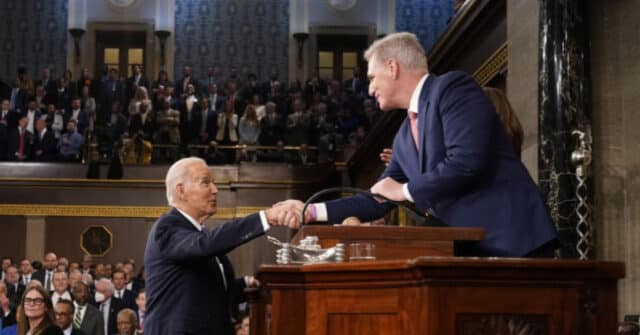In a significant development in the United States’ political landscape, President Joe Biden and House Speaker Kevin McCarthy have reached an “agreement in principle” to limit federal spending and resolve the looming debt crisis. This agreement was reached just ahead of the June 5 deadline, thereby potentially averting a catastrophic U.S. default.
The Democratic president and the Republican speaker reached this agreement after a phone conversation on Saturday evening. The agreement comes as a relief to the country and the world, which have been anxiously watching the political standoff that threatened the U.S. and global economy.
The agreement in principle allows for a legislative package to be drafted and shared with lawmakers in time for votes early next week in the House and later in the Senate. The package is centered around a two-year budget deal that would hold spending flat for 2024 and impose limits for 2025 in exchange for raising the debt limit for two years. This would push the volatile political issue past the next presidential election.
Negotiators agreed to some Republican demands for enhanced work requirements on recipients of food stamps, a point that had sparked an uproar from House Democrats as a nonstarter. The Republican House speaker had gathered top allies behind closed doors at the Capitol as negotiators pushed for a deal that would raise the nation’s borrowing limit and avoid a first-ever default on the federal debt, while also making spending cuts that House Republicans are demanding.
As the deadline loomed, President Biden and House Speaker Kevin McCarthy were in constant communication, with Biden speaking to his negotiating team multiple times a day, signing off on offers and counteroffers. The president, spending part of the weekend at Camp David, was upbeat as he departed the White House on Friday evening, saying, “It’s very close, and I’m optimistic.”
The agreement in principle is a significant step towards averting a potential economic disaster. Failure to lift the borrowing limit, now $31 trillion, to pay the nation’s incurred bills, would send shockwaves through the U.S. and global economy. Treasury Secretary Janet Yellen had warned that the United States could default on its debt obligations by June 5 if lawmakers did not act in time to raise the federal debt ceiling.
This agreement marks a significant moment of bipartisan cooperation in an era of deep political division. It serves as a reminder that despite differences, leaders can come together to make critical decisions for the good of the nation.
Sources:





